Organizational Behavior and Management Report: Holiday Inn Analysis
VerifiedAdded on 2023/01/04
|11
|3216
|38
Report
AI Summary
This report provides an in-depth analysis of Holiday Inn's management and organizational behavior. It begins with an overview of the company's organizational structure, culture (including Handy's culture model), and goals. The report then examines recent change initiatives implemented in response to the COVID-19 pandemic, detailing new guidelines related to cleanliness, social distancing, and guest safety, and analyzes the impact of these changes using Kurt Lewin's change management theory. Finally, the report evaluates Holiday Inn's strategic direction, focusing on Porter's generic strategies (particularly differentiation), and assesses the company's business performance using Key Performance Indicators (KPIs) to measure progress toward its objectives. The report highlights how Holiday Inn adapts to the dynamic business environment and maintains its market position.
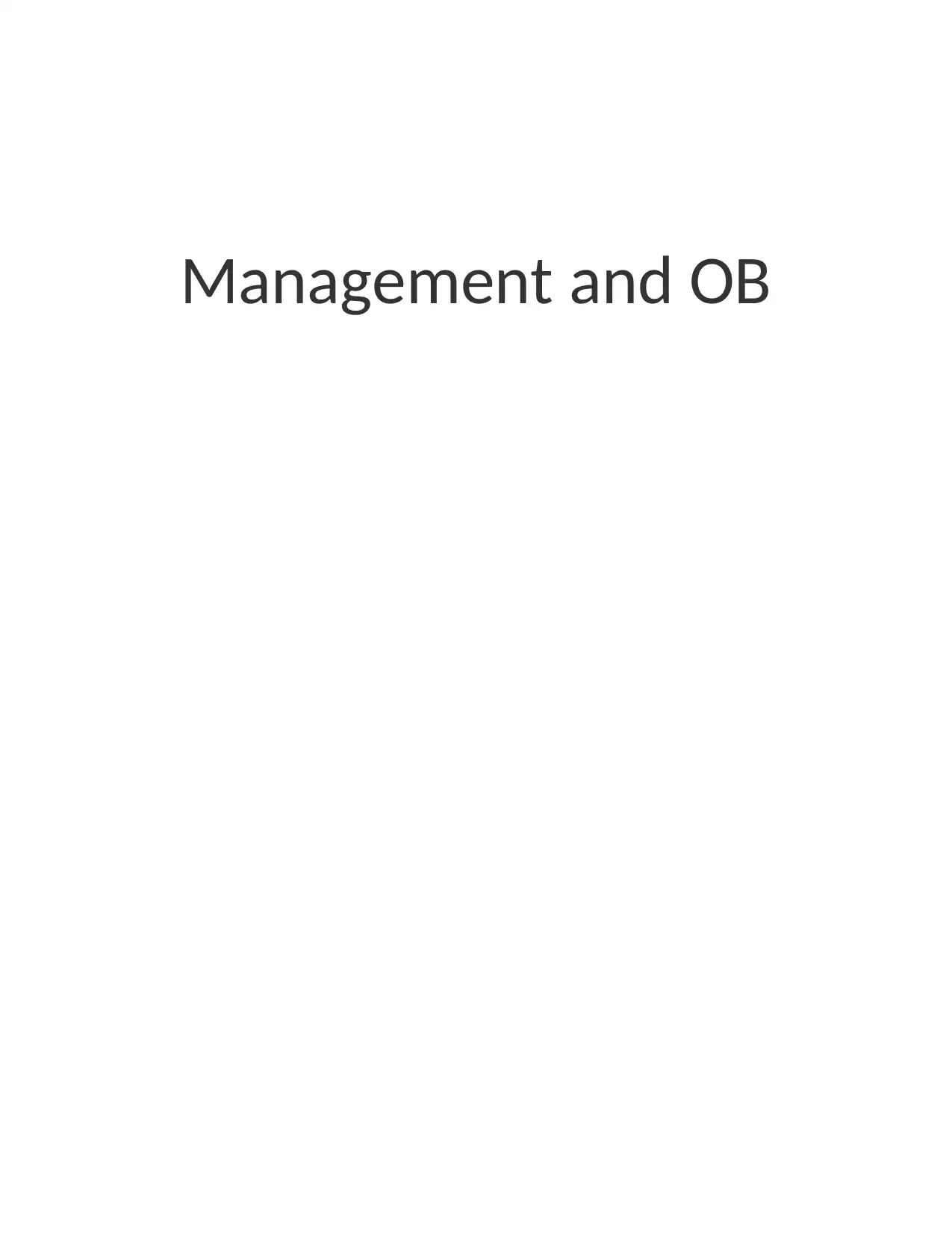
Management and OB
Paraphrase This Document
Need a fresh take? Get an instant paraphrase of this document with our AI Paraphraser
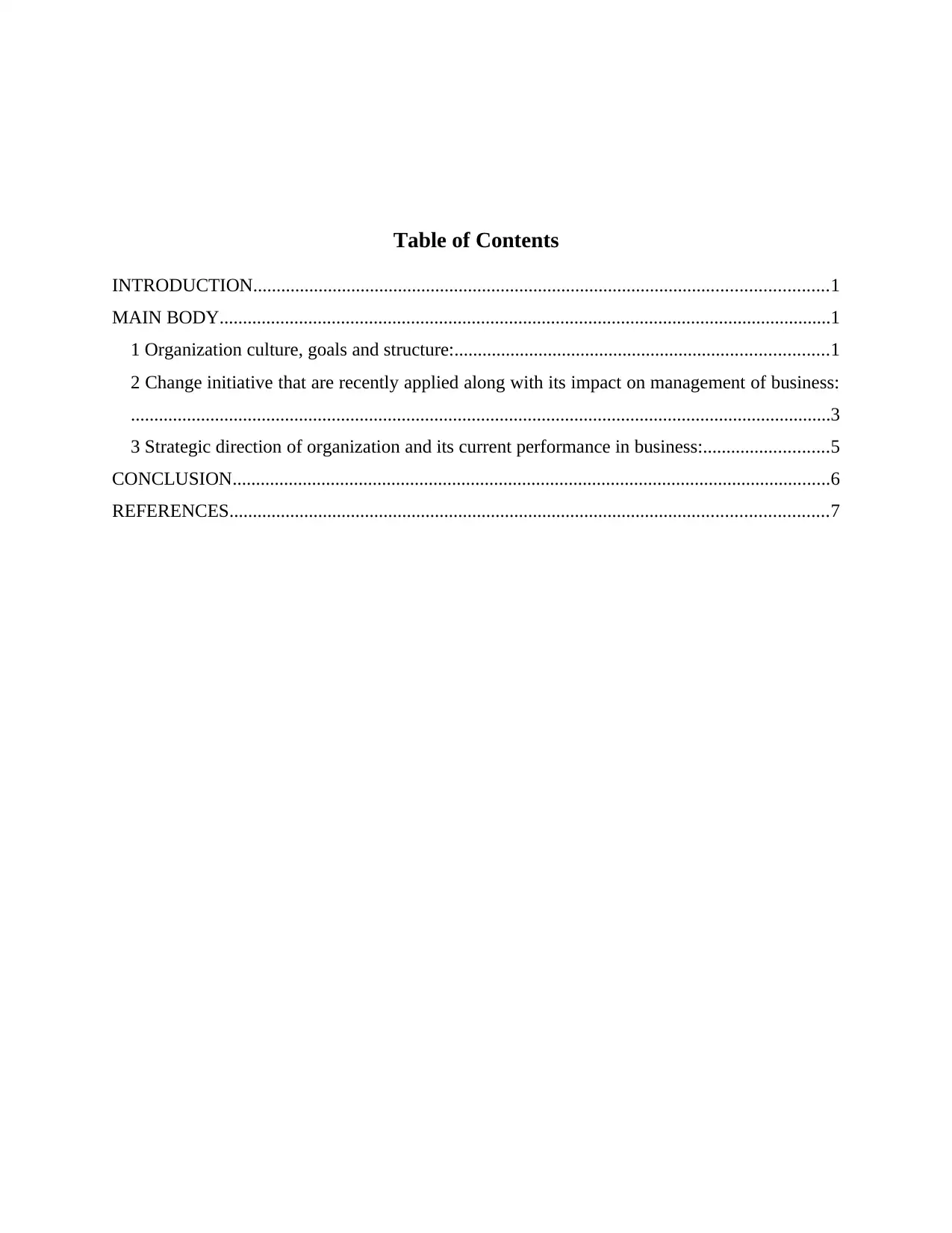
Table of Contents
INTRODUCTION...........................................................................................................................1
MAIN BODY...................................................................................................................................1
1 Organization culture, goals and structure:................................................................................1
2 Change initiative that are recently applied along with its impact on management of business:
......................................................................................................................................................3
3 Strategic direction of organization and its current performance in business:...........................5
CONCLUSION................................................................................................................................6
REFERENCES................................................................................................................................7
INTRODUCTION...........................................................................................................................1
MAIN BODY...................................................................................................................................1
1 Organization culture, goals and structure:................................................................................1
2 Change initiative that are recently applied along with its impact on management of business:
......................................................................................................................................................3
3 Strategic direction of organization and its current performance in business:...........................5
CONCLUSION................................................................................................................................6
REFERENCES................................................................................................................................7
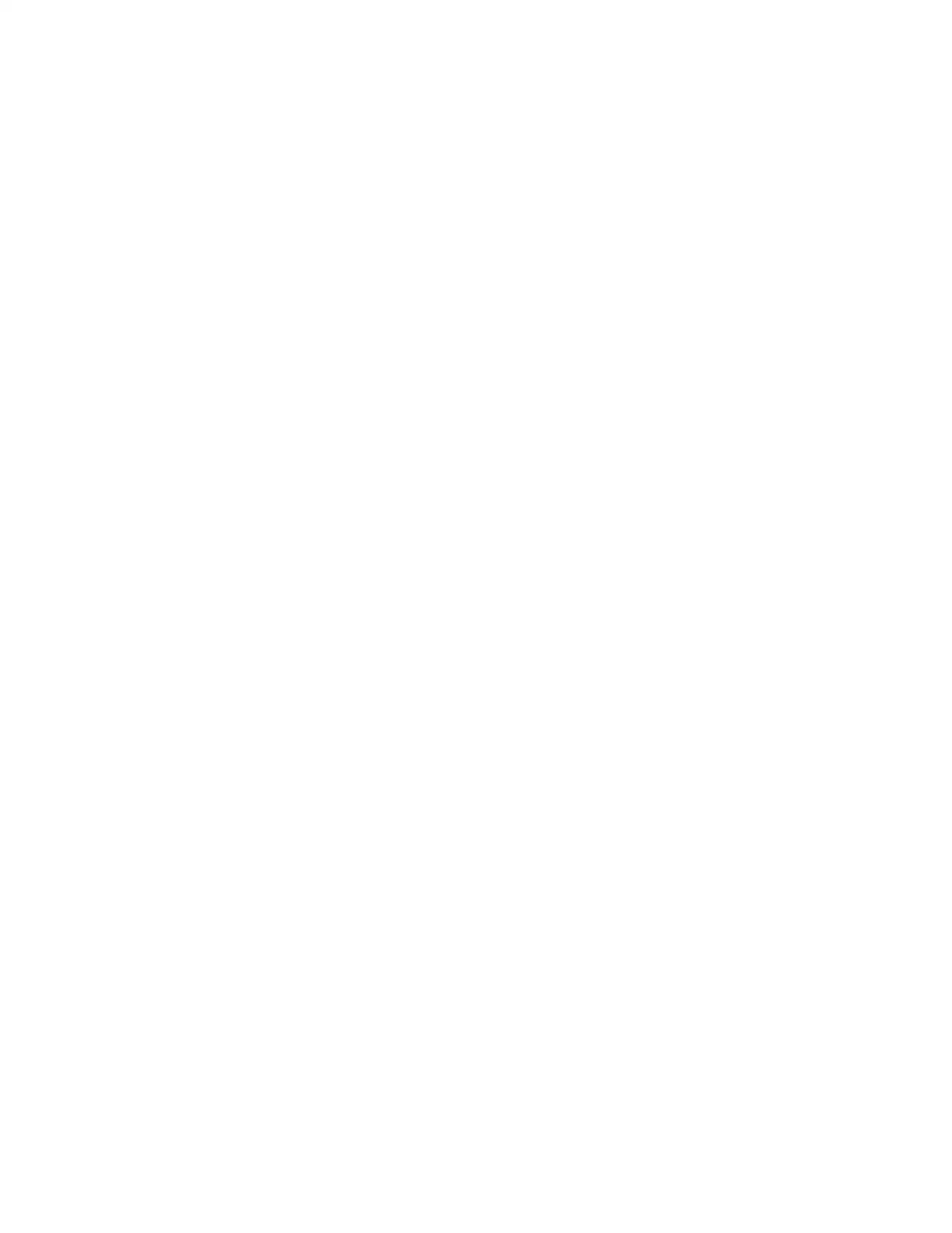
⊘ This is a preview!⊘
Do you want full access?
Subscribe today to unlock all pages.

Trusted by 1+ million students worldwide
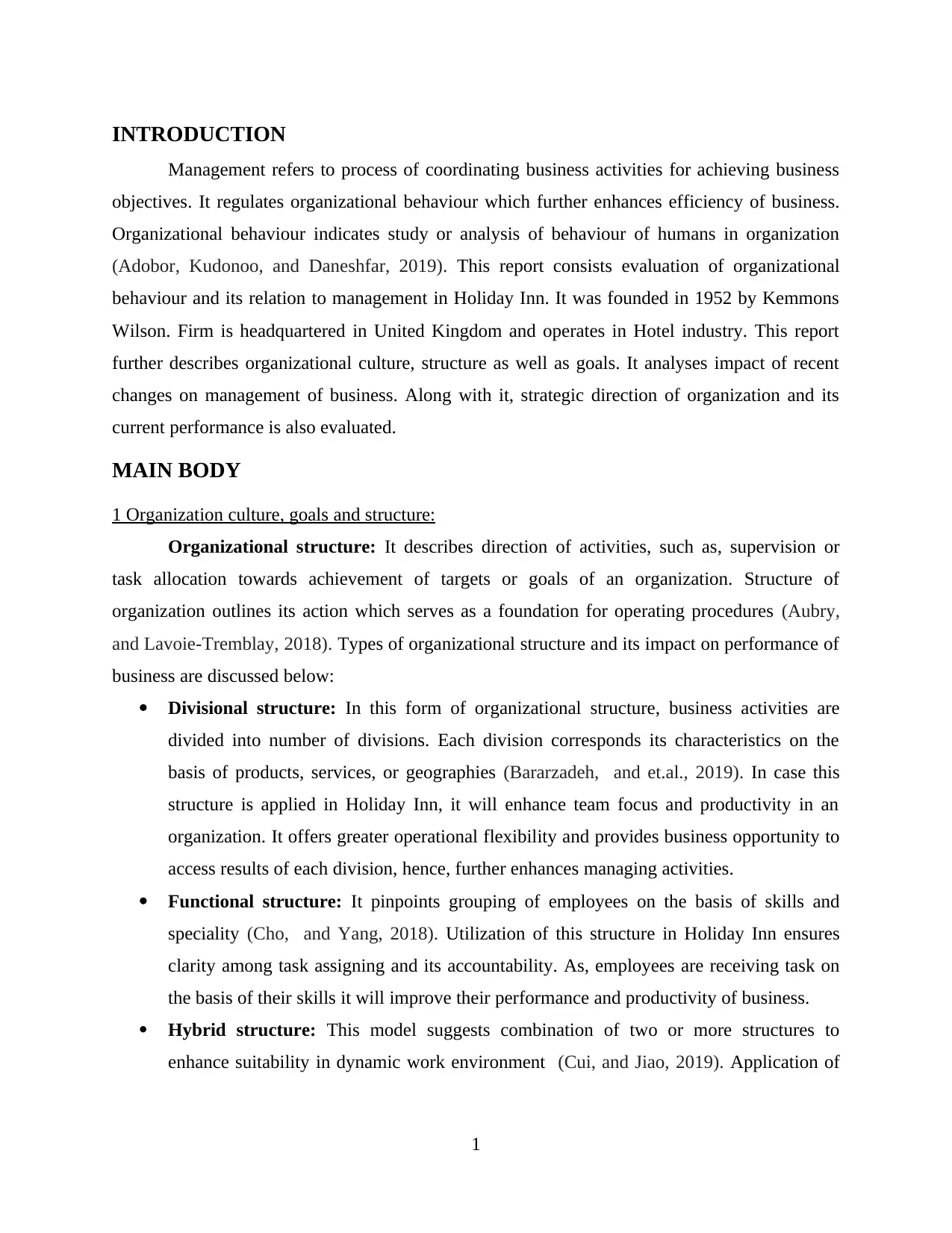
INTRODUCTION
Management refers to process of coordinating business activities for achieving business
objectives. It regulates organizational behaviour which further enhances efficiency of business.
Organizational behaviour indicates study or analysis of behaviour of humans in organization
(Adobor, Kudonoo, and Daneshfar, 2019). This report consists evaluation of organizational
behaviour and its relation to management in Holiday Inn. It was founded in 1952 by Kemmons
Wilson. Firm is headquartered in United Kingdom and operates in Hotel industry. This report
further describes organizational culture, structure as well as goals. It analyses impact of recent
changes on management of business. Along with it, strategic direction of organization and its
current performance is also evaluated.
MAIN BODY
1 Organization culture, goals and structure:
Organizational structure: It describes direction of activities, such as, supervision or
task allocation towards achievement of targets or goals of an organization. Structure of
organization outlines its action which serves as a foundation for operating procedures (Aubry,
and Lavoie-Tremblay, 2018). Types of organizational structure and its impact on performance of
business are discussed below:
Divisional structure: In this form of organizational structure, business activities are
divided into number of divisions. Each division corresponds its characteristics on the
basis of products, services, or geographies (Bararzadeh, and et.al., 2019). In case this
structure is applied in Holiday Inn, it will enhance team focus and productivity in an
organization. It offers greater operational flexibility and provides business opportunity to
access results of each division, hence, further enhances managing activities.
Functional structure: It pinpoints grouping of employees on the basis of skills and
speciality (Cho, and Yang, 2018). Utilization of this structure in Holiday Inn ensures
clarity among task assigning and its accountability. As, employees are receiving task on
the basis of their skills it will improve their performance and productivity of business.
Hybrid structure: This model suggests combination of two or more structures to
enhance suitability in dynamic work environment (Cui, and Jiao, 2019). Application of
1
Management refers to process of coordinating business activities for achieving business
objectives. It regulates organizational behaviour which further enhances efficiency of business.
Organizational behaviour indicates study or analysis of behaviour of humans in organization
(Adobor, Kudonoo, and Daneshfar, 2019). This report consists evaluation of organizational
behaviour and its relation to management in Holiday Inn. It was founded in 1952 by Kemmons
Wilson. Firm is headquartered in United Kingdom and operates in Hotel industry. This report
further describes organizational culture, structure as well as goals. It analyses impact of recent
changes on management of business. Along with it, strategic direction of organization and its
current performance is also evaluated.
MAIN BODY
1 Organization culture, goals and structure:
Organizational structure: It describes direction of activities, such as, supervision or
task allocation towards achievement of targets or goals of an organization. Structure of
organization outlines its action which serves as a foundation for operating procedures (Aubry,
and Lavoie-Tremblay, 2018). Types of organizational structure and its impact on performance of
business are discussed below:
Divisional structure: In this form of organizational structure, business activities are
divided into number of divisions. Each division corresponds its characteristics on the
basis of products, services, or geographies (Bararzadeh, and et.al., 2019). In case this
structure is applied in Holiday Inn, it will enhance team focus and productivity in an
organization. It offers greater operational flexibility and provides business opportunity to
access results of each division, hence, further enhances managing activities.
Functional structure: It pinpoints grouping of employees on the basis of skills and
speciality (Cho, and Yang, 2018). Utilization of this structure in Holiday Inn ensures
clarity among task assigning and its accountability. As, employees are receiving task on
the basis of their skills it will improve their performance and productivity of business.
Hybrid structure: This model suggests combination of two or more structures to
enhance suitability in dynamic work environment (Cui, and Jiao, 2019). Application of
1
Paraphrase This Document
Need a fresh take? Get an instant paraphrase of this document with our AI Paraphraser
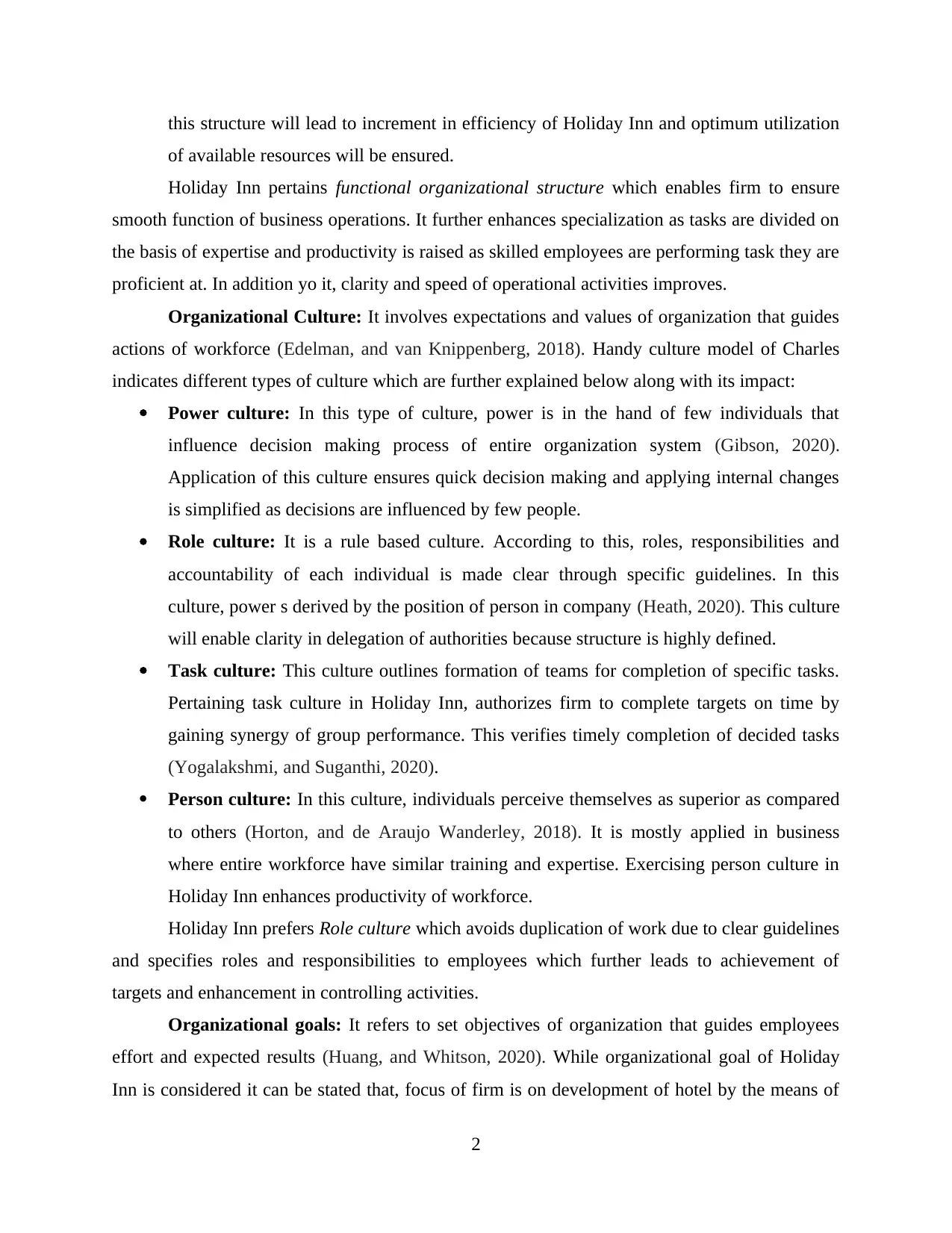
this structure will lead to increment in efficiency of Holiday Inn and optimum utilization
of available resources will be ensured.
Holiday Inn pertains functional organizational structure which enables firm to ensure
smooth function of business operations. It further enhances specialization as tasks are divided on
the basis of expertise and productivity is raised as skilled employees are performing task they are
proficient at. In addition yo it, clarity and speed of operational activities improves.
Organizational Culture: It involves expectations and values of organization that guides
actions of workforce (Edelman, and van Knippenberg, 2018). Handy culture model of Charles
indicates different types of culture which are further explained below along with its impact:
Power culture: In this type of culture, power is in the hand of few individuals that
influence decision making process of entire organization system (Gibson, 2020).
Application of this culture ensures quick decision making and applying internal changes
is simplified as decisions are influenced by few people.
Role culture: It is a rule based culture. According to this, roles, responsibilities and
accountability of each individual is made clear through specific guidelines. In this
culture, power s derived by the position of person in company (Heath, 2020). This culture
will enable clarity in delegation of authorities because structure is highly defined.
Task culture: This culture outlines formation of teams for completion of specific tasks.
Pertaining task culture in Holiday Inn, authorizes firm to complete targets on time by
gaining synergy of group performance. This verifies timely completion of decided tasks
(Yogalakshmi, and Suganthi, 2020).
Person culture: In this culture, individuals perceive themselves as superior as compared
to others (Horton, and de Araujo Wanderley, 2018). It is mostly applied in business
where entire workforce have similar training and expertise. Exercising person culture in
Holiday Inn enhances productivity of workforce.
Holiday Inn prefers Role culture which avoids duplication of work due to clear guidelines
and specifies roles and responsibilities to employees which further leads to achievement of
targets and enhancement in controlling activities.
Organizational goals: It refers to set objectives of organization that guides employees
effort and expected results (Huang, and Whitson, 2020). While organizational goal of Holiday
Inn is considered it can be stated that, focus of firm is on development of hotel by the means of
2
of available resources will be ensured.
Holiday Inn pertains functional organizational structure which enables firm to ensure
smooth function of business operations. It further enhances specialization as tasks are divided on
the basis of expertise and productivity is raised as skilled employees are performing task they are
proficient at. In addition yo it, clarity and speed of operational activities improves.
Organizational Culture: It involves expectations and values of organization that guides
actions of workforce (Edelman, and van Knippenberg, 2018). Handy culture model of Charles
indicates different types of culture which are further explained below along with its impact:
Power culture: In this type of culture, power is in the hand of few individuals that
influence decision making process of entire organization system (Gibson, 2020).
Application of this culture ensures quick decision making and applying internal changes
is simplified as decisions are influenced by few people.
Role culture: It is a rule based culture. According to this, roles, responsibilities and
accountability of each individual is made clear through specific guidelines. In this
culture, power s derived by the position of person in company (Heath, 2020). This culture
will enable clarity in delegation of authorities because structure is highly defined.
Task culture: This culture outlines formation of teams for completion of specific tasks.
Pertaining task culture in Holiday Inn, authorizes firm to complete targets on time by
gaining synergy of group performance. This verifies timely completion of decided tasks
(Yogalakshmi, and Suganthi, 2020).
Person culture: In this culture, individuals perceive themselves as superior as compared
to others (Horton, and de Araujo Wanderley, 2018). It is mostly applied in business
where entire workforce have similar training and expertise. Exercising person culture in
Holiday Inn enhances productivity of workforce.
Holiday Inn prefers Role culture which avoids duplication of work due to clear guidelines
and specifies roles and responsibilities to employees which further leads to achievement of
targets and enhancement in controlling activities.
Organizational goals: It refers to set objectives of organization that guides employees
effort and expected results (Huang, and Whitson, 2020). While organizational goal of Holiday
Inn is considered it can be stated that, focus of firm is on development of hotel by the means of
2
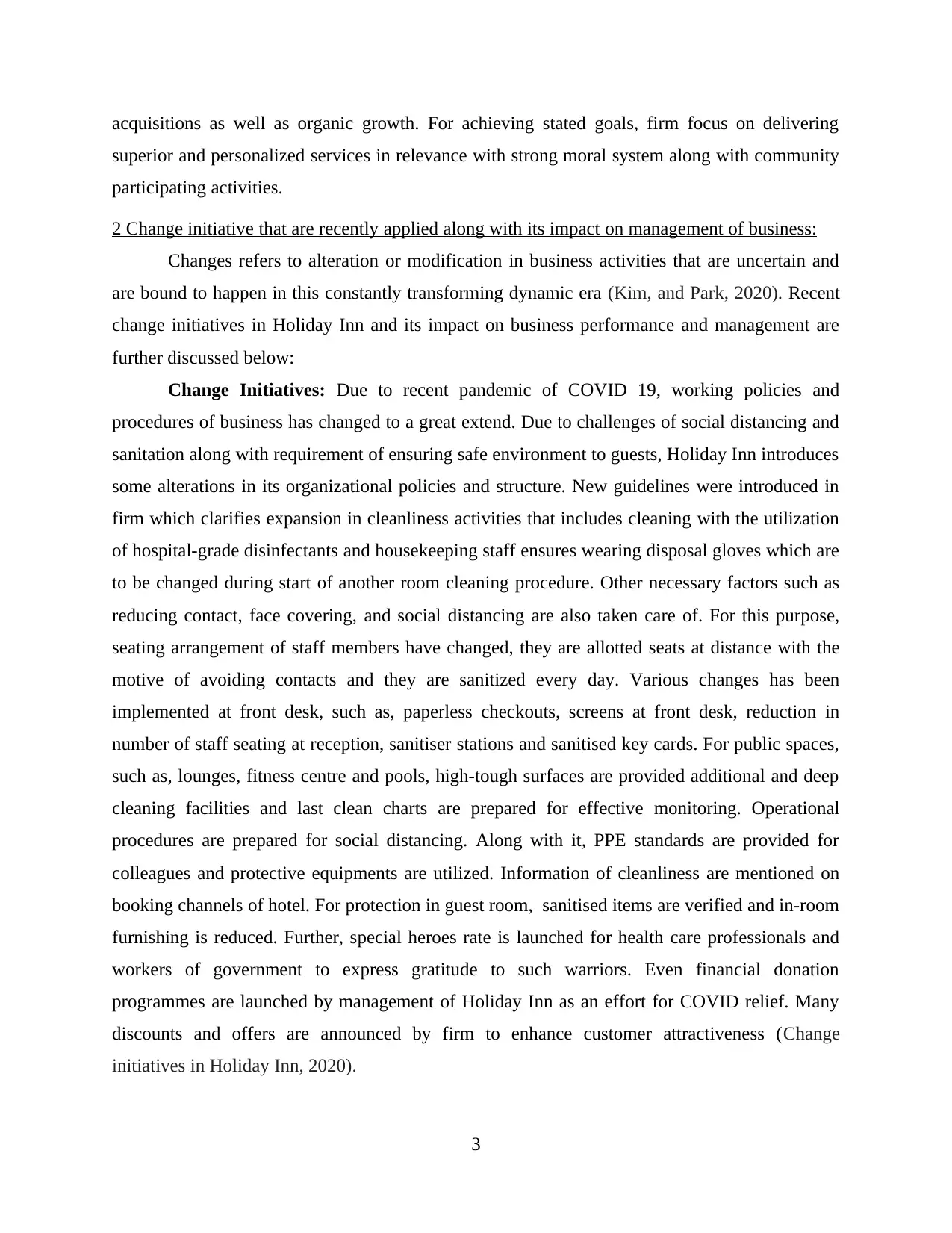
acquisitions as well as organic growth. For achieving stated goals, firm focus on delivering
superior and personalized services in relevance with strong moral system along with community
participating activities.
2 Change initiative that are recently applied along with its impact on management of business:
Changes refers to alteration or modification in business activities that are uncertain and
are bound to happen in this constantly transforming dynamic era (Kim, and Park, 2020). Recent
change initiatives in Holiday Inn and its impact on business performance and management are
further discussed below:
Change Initiatives: Due to recent pandemic of COVID 19, working policies and
procedures of business has changed to a great extend. Due to challenges of social distancing and
sanitation along with requirement of ensuring safe environment to guests, Holiday Inn introduces
some alterations in its organizational policies and structure. New guidelines were introduced in
firm which clarifies expansion in cleanliness activities that includes cleaning with the utilization
of hospital-grade disinfectants and housekeeping staff ensures wearing disposal gloves which are
to be changed during start of another room cleaning procedure. Other necessary factors such as
reducing contact, face covering, and social distancing are also taken care of. For this purpose,
seating arrangement of staff members have changed, they are allotted seats at distance with the
motive of avoiding contacts and they are sanitized every day. Various changes has been
implemented at front desk, such as, paperless checkouts, screens at front desk, reduction in
number of staff seating at reception, sanitiser stations and sanitised key cards. For public spaces,
such as, lounges, fitness centre and pools, high-tough surfaces are provided additional and deep
cleaning facilities and last clean charts are prepared for effective monitoring. Operational
procedures are prepared for social distancing. Along with it, PPE standards are provided for
colleagues and protective equipments are utilized. Information of cleanliness are mentioned on
booking channels of hotel. For protection in guest room, sanitised items are verified and in-room
furnishing is reduced. Further, special heroes rate is launched for health care professionals and
workers of government to express gratitude to such warriors. Even financial donation
programmes are launched by management of Holiday Inn as an effort for COVID relief. Many
discounts and offers are announced by firm to enhance customer attractiveness (Change
initiatives in Holiday Inn, 2020).
3
superior and personalized services in relevance with strong moral system along with community
participating activities.
2 Change initiative that are recently applied along with its impact on management of business:
Changes refers to alteration or modification in business activities that are uncertain and
are bound to happen in this constantly transforming dynamic era (Kim, and Park, 2020). Recent
change initiatives in Holiday Inn and its impact on business performance and management are
further discussed below:
Change Initiatives: Due to recent pandemic of COVID 19, working policies and
procedures of business has changed to a great extend. Due to challenges of social distancing and
sanitation along with requirement of ensuring safe environment to guests, Holiday Inn introduces
some alterations in its organizational policies and structure. New guidelines were introduced in
firm which clarifies expansion in cleanliness activities that includes cleaning with the utilization
of hospital-grade disinfectants and housekeeping staff ensures wearing disposal gloves which are
to be changed during start of another room cleaning procedure. Other necessary factors such as
reducing contact, face covering, and social distancing are also taken care of. For this purpose,
seating arrangement of staff members have changed, they are allotted seats at distance with the
motive of avoiding contacts and they are sanitized every day. Various changes has been
implemented at front desk, such as, paperless checkouts, screens at front desk, reduction in
number of staff seating at reception, sanitiser stations and sanitised key cards. For public spaces,
such as, lounges, fitness centre and pools, high-tough surfaces are provided additional and deep
cleaning facilities and last clean charts are prepared for effective monitoring. Operational
procedures are prepared for social distancing. Along with it, PPE standards are provided for
colleagues and protective equipments are utilized. Information of cleanliness are mentioned on
booking channels of hotel. For protection in guest room, sanitised items are verified and in-room
furnishing is reduced. Further, special heroes rate is launched for health care professionals and
workers of government to express gratitude to such warriors. Even financial donation
programmes are launched by management of Holiday Inn as an effort for COVID relief. Many
discounts and offers are announced by firm to enhance customer attractiveness (Change
initiatives in Holiday Inn, 2020).
3
⊘ This is a preview!⊘
Do you want full access?
Subscribe today to unlock all pages.

Trusted by 1+ million students worldwide
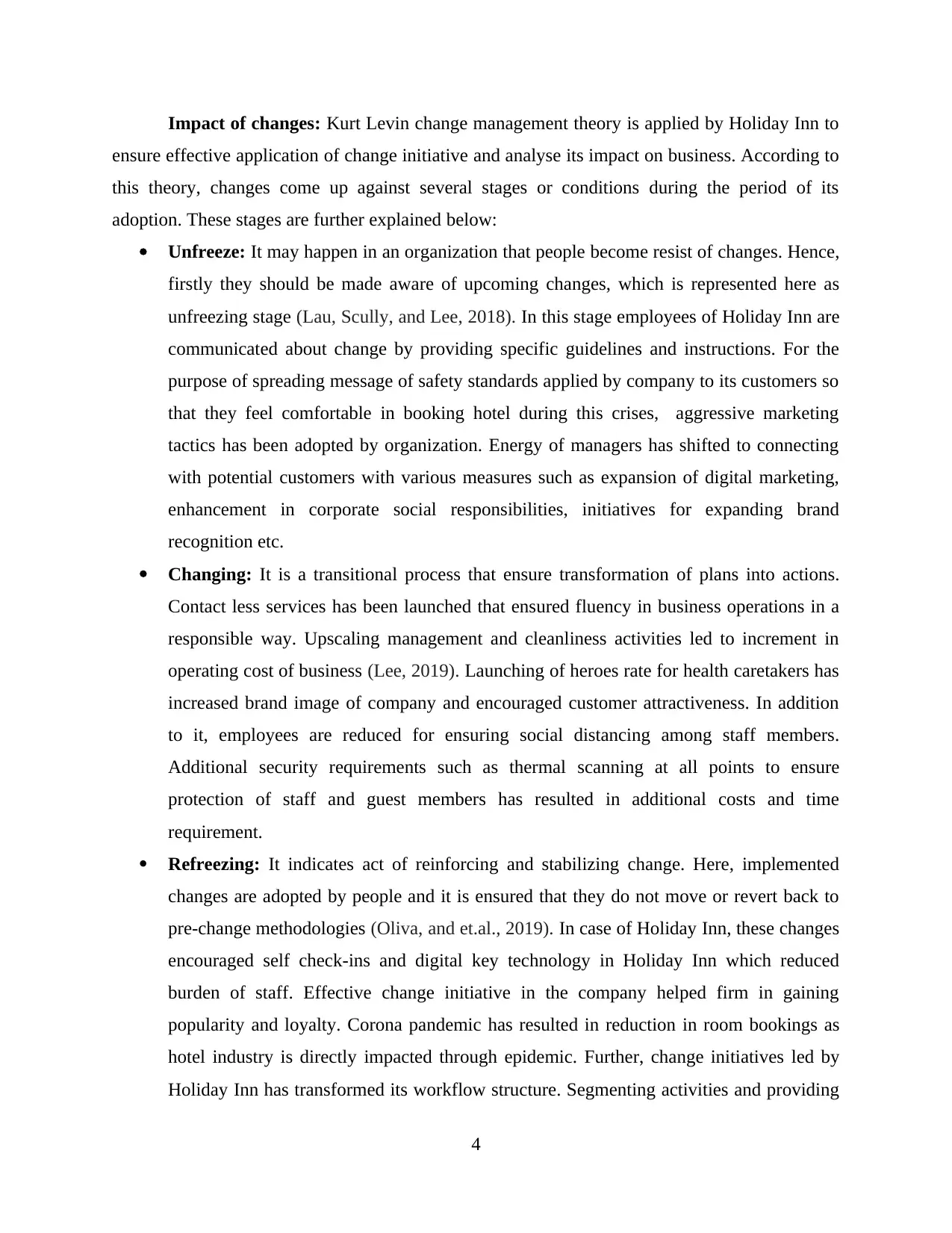
Impact of changes: Kurt Levin change management theory is applied by Holiday Inn to
ensure effective application of change initiative and analyse its impact on business. According to
this theory, changes come up against several stages or conditions during the period of its
adoption. These stages are further explained below:
Unfreeze: It may happen in an organization that people become resist of changes. Hence,
firstly they should be made aware of upcoming changes, which is represented here as
unfreezing stage (Lau, Scully, and Lee, 2018). In this stage employees of Holiday Inn are
communicated about change by providing specific guidelines and instructions. For the
purpose of spreading message of safety standards applied by company to its customers so
that they feel comfortable in booking hotel during this crises, aggressive marketing
tactics has been adopted by organization. Energy of managers has shifted to connecting
with potential customers with various measures such as expansion of digital marketing,
enhancement in corporate social responsibilities, initiatives for expanding brand
recognition etc.
Changing: It is a transitional process that ensure transformation of plans into actions.
Contact less services has been launched that ensured fluency in business operations in a
responsible way. Upscaling management and cleanliness activities led to increment in
operating cost of business (Lee, 2019). Launching of heroes rate for health caretakers has
increased brand image of company and encouraged customer attractiveness. In addition
to it, employees are reduced for ensuring social distancing among staff members.
Additional security requirements such as thermal scanning at all points to ensure
protection of staff and guest members has resulted in additional costs and time
requirement.
Refreezing: It indicates act of reinforcing and stabilizing change. Here, implemented
changes are adopted by people and it is ensured that they do not move or revert back to
pre-change methodologies (Oliva, and et.al., 2019). In case of Holiday Inn, these changes
encouraged self check-ins and digital key technology in Holiday Inn which reduced
burden of staff. Effective change initiative in the company helped firm in gaining
popularity and loyalty. Corona pandemic has resulted in reduction in room bookings as
hotel industry is directly impacted through epidemic. Further, change initiatives led by
Holiday Inn has transformed its workflow structure. Segmenting activities and providing
4
ensure effective application of change initiative and analyse its impact on business. According to
this theory, changes come up against several stages or conditions during the period of its
adoption. These stages are further explained below:
Unfreeze: It may happen in an organization that people become resist of changes. Hence,
firstly they should be made aware of upcoming changes, which is represented here as
unfreezing stage (Lau, Scully, and Lee, 2018). In this stage employees of Holiday Inn are
communicated about change by providing specific guidelines and instructions. For the
purpose of spreading message of safety standards applied by company to its customers so
that they feel comfortable in booking hotel during this crises, aggressive marketing
tactics has been adopted by organization. Energy of managers has shifted to connecting
with potential customers with various measures such as expansion of digital marketing,
enhancement in corporate social responsibilities, initiatives for expanding brand
recognition etc.
Changing: It is a transitional process that ensure transformation of plans into actions.
Contact less services has been launched that ensured fluency in business operations in a
responsible way. Upscaling management and cleanliness activities led to increment in
operating cost of business (Lee, 2019). Launching of heroes rate for health caretakers has
increased brand image of company and encouraged customer attractiveness. In addition
to it, employees are reduced for ensuring social distancing among staff members.
Additional security requirements such as thermal scanning at all points to ensure
protection of staff and guest members has resulted in additional costs and time
requirement.
Refreezing: It indicates act of reinforcing and stabilizing change. Here, implemented
changes are adopted by people and it is ensured that they do not move or revert back to
pre-change methodologies (Oliva, and et.al., 2019). In case of Holiday Inn, these changes
encouraged self check-ins and digital key technology in Holiday Inn which reduced
burden of staff. Effective change initiative in the company helped firm in gaining
popularity and loyalty. Corona pandemic has resulted in reduction in room bookings as
hotel industry is directly impacted through epidemic. Further, change initiatives led by
Holiday Inn has transformed its workflow structure. Segmenting activities and providing
4
Paraphrase This Document
Need a fresh take? Get an instant paraphrase of this document with our AI Paraphraser
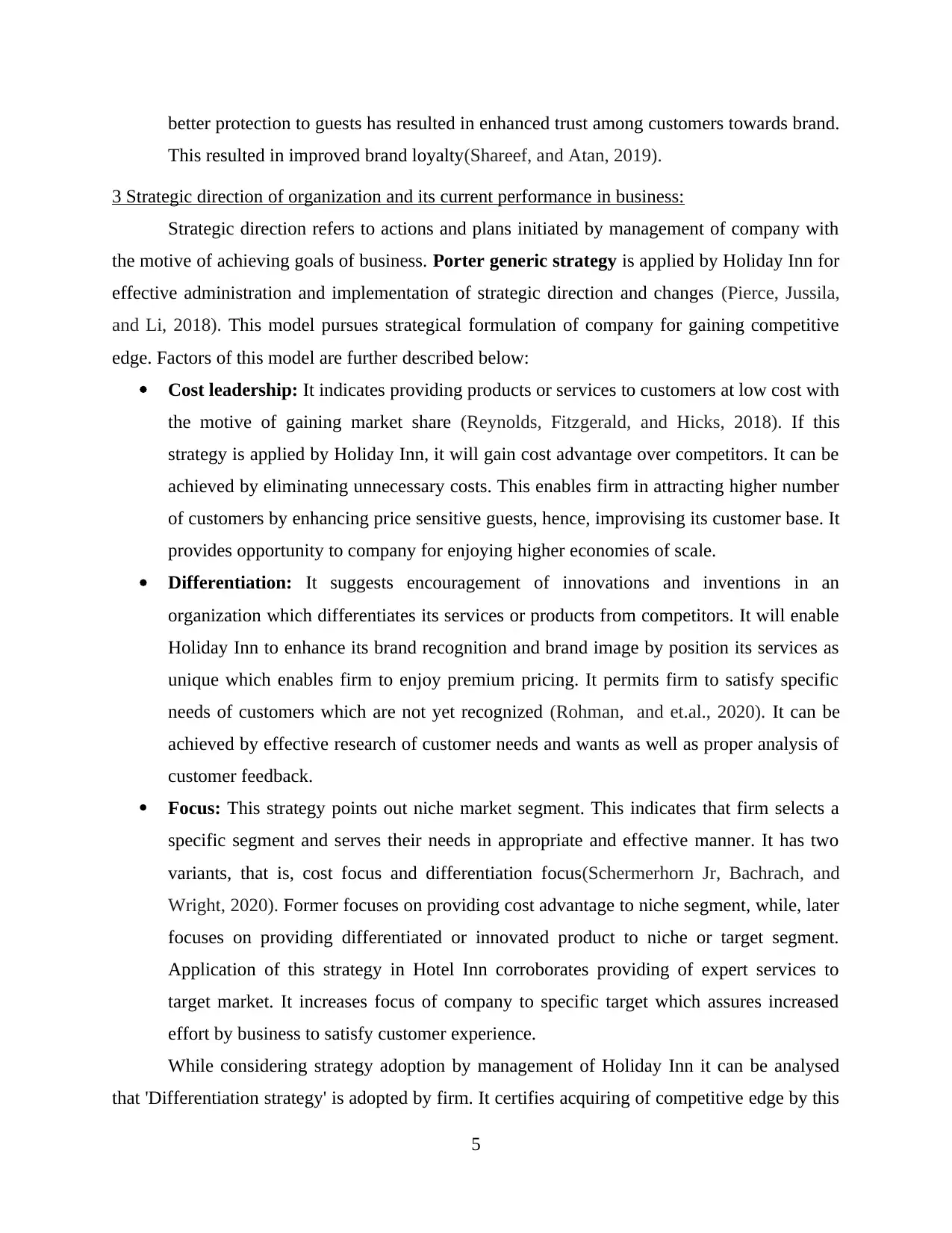
better protection to guests has resulted in enhanced trust among customers towards brand.
This resulted in improved brand loyalty(Shareef, and Atan, 2019).
3 Strategic direction of organization and its current performance in business:
Strategic direction refers to actions and plans initiated by management of company with
the motive of achieving goals of business. Porter generic strategy is applied by Holiday Inn for
effective administration and implementation of strategic direction and changes (Pierce, Jussila,
and Li, 2018). This model pursues strategical formulation of company for gaining competitive
edge. Factors of this model are further described below:
Cost leadership: It indicates providing products or services to customers at low cost with
the motive of gaining market share (Reynolds, Fitzgerald, and Hicks, 2018). If this
strategy is applied by Holiday Inn, it will gain cost advantage over competitors. It can be
achieved by eliminating unnecessary costs. This enables firm in attracting higher number
of customers by enhancing price sensitive guests, hence, improvising its customer base. It
provides opportunity to company for enjoying higher economies of scale.
Differentiation: It suggests encouragement of innovations and inventions in an
organization which differentiates its services or products from competitors. It will enable
Holiday Inn to enhance its brand recognition and brand image by position its services as
unique which enables firm to enjoy premium pricing. It permits firm to satisfy specific
needs of customers which are not yet recognized (Rohman, and et.al., 2020). It can be
achieved by effective research of customer needs and wants as well as proper analysis of
customer feedback.
Focus: This strategy points out niche market segment. This indicates that firm selects a
specific segment and serves their needs in appropriate and effective manner. It has two
variants, that is, cost focus and differentiation focus(Schermerhorn Jr, Bachrach, and
Wright, 2020). Former focuses on providing cost advantage to niche segment, while, later
focuses on providing differentiated or innovated product to niche or target segment.
Application of this strategy in Hotel Inn corroborates providing of expert services to
target market. It increases focus of company to specific target which assures increased
effort by business to satisfy customer experience.
While considering strategy adoption by management of Holiday Inn it can be analysed
that 'Differentiation strategy' is adopted by firm. It certifies acquiring of competitive edge by this
5
This resulted in improved brand loyalty(Shareef, and Atan, 2019).
3 Strategic direction of organization and its current performance in business:
Strategic direction refers to actions and plans initiated by management of company with
the motive of achieving goals of business. Porter generic strategy is applied by Holiday Inn for
effective administration and implementation of strategic direction and changes (Pierce, Jussila,
and Li, 2018). This model pursues strategical formulation of company for gaining competitive
edge. Factors of this model are further described below:
Cost leadership: It indicates providing products or services to customers at low cost with
the motive of gaining market share (Reynolds, Fitzgerald, and Hicks, 2018). If this
strategy is applied by Holiday Inn, it will gain cost advantage over competitors. It can be
achieved by eliminating unnecessary costs. This enables firm in attracting higher number
of customers by enhancing price sensitive guests, hence, improvising its customer base. It
provides opportunity to company for enjoying higher economies of scale.
Differentiation: It suggests encouragement of innovations and inventions in an
organization which differentiates its services or products from competitors. It will enable
Holiday Inn to enhance its brand recognition and brand image by position its services as
unique which enables firm to enjoy premium pricing. It permits firm to satisfy specific
needs of customers which are not yet recognized (Rohman, and et.al., 2020). It can be
achieved by effective research of customer needs and wants as well as proper analysis of
customer feedback.
Focus: This strategy points out niche market segment. This indicates that firm selects a
specific segment and serves their needs in appropriate and effective manner. It has two
variants, that is, cost focus and differentiation focus(Schermerhorn Jr, Bachrach, and
Wright, 2020). Former focuses on providing cost advantage to niche segment, while, later
focuses on providing differentiated or innovated product to niche or target segment.
Application of this strategy in Hotel Inn corroborates providing of expert services to
target market. It increases focus of company to specific target which assures increased
effort by business to satisfy customer experience.
While considering strategy adoption by management of Holiday Inn it can be analysed
that 'Differentiation strategy' is adopted by firm. It certifies acquiring of competitive edge by this
5
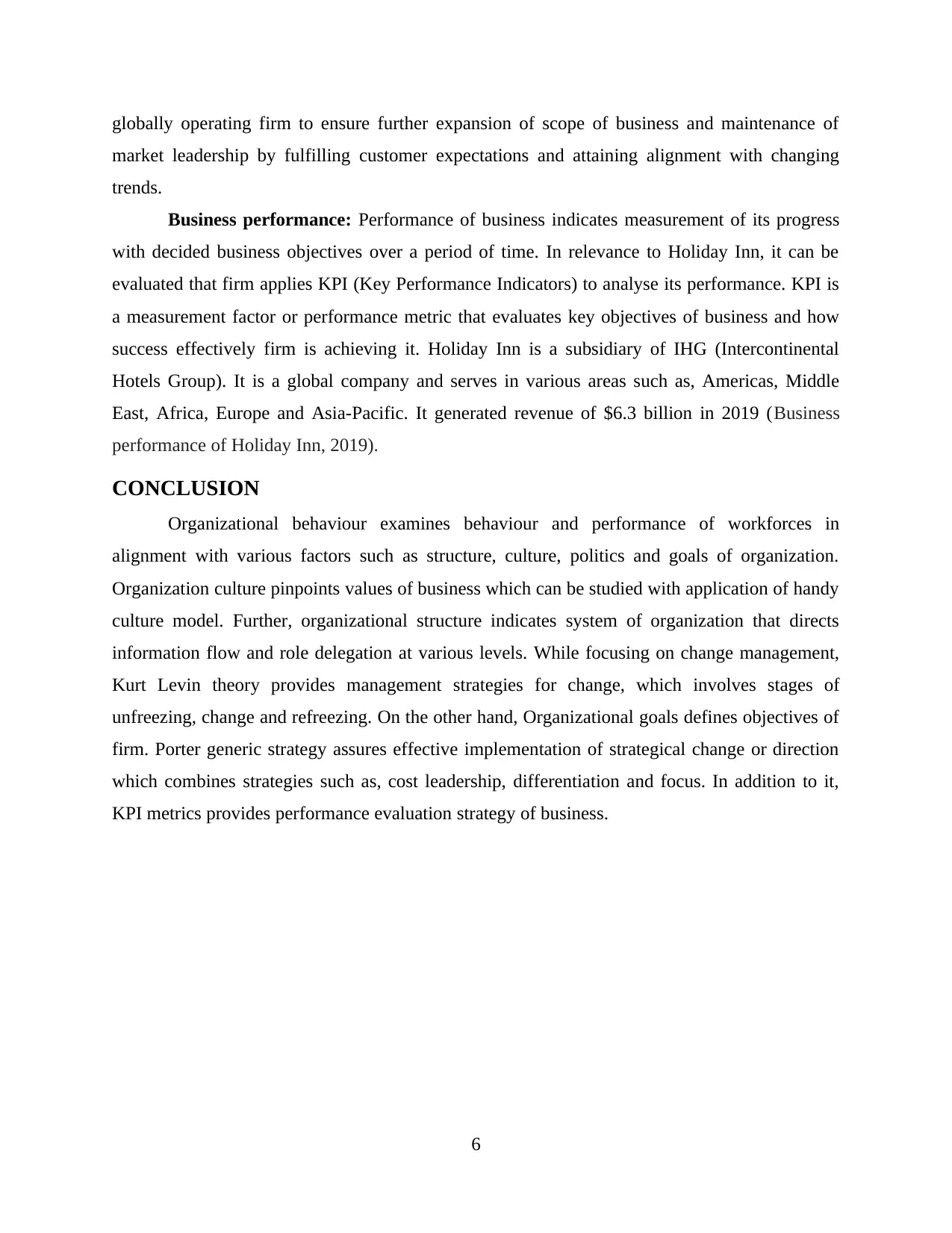
globally operating firm to ensure further expansion of scope of business and maintenance of
market leadership by fulfilling customer expectations and attaining alignment with changing
trends.
Business performance: Performance of business indicates measurement of its progress
with decided business objectives over a period of time. In relevance to Holiday Inn, it can be
evaluated that firm applies KPI (Key Performance Indicators) to analyse its performance. KPI is
a measurement factor or performance metric that evaluates key objectives of business and how
success effectively firm is achieving it. Holiday Inn is a subsidiary of IHG (Intercontinental
Hotels Group). It is a global company and serves in various areas such as, Americas, Middle
East, Africa, Europe and Asia-Pacific. It generated revenue of $6.3 billion in 2019 (Business
performance of Holiday Inn, 2019).
CONCLUSION
Organizational behaviour examines behaviour and performance of workforces in
alignment with various factors such as structure, culture, politics and goals of organization.
Organization culture pinpoints values of business which can be studied with application of handy
culture model. Further, organizational structure indicates system of organization that directs
information flow and role delegation at various levels. While focusing on change management,
Kurt Levin theory provides management strategies for change, which involves stages of
unfreezing, change and refreezing. On the other hand, Organizational goals defines objectives of
firm. Porter generic strategy assures effective implementation of strategical change or direction
which combines strategies such as, cost leadership, differentiation and focus. In addition to it,
KPI metrics provides performance evaluation strategy of business.
6
market leadership by fulfilling customer expectations and attaining alignment with changing
trends.
Business performance: Performance of business indicates measurement of its progress
with decided business objectives over a period of time. In relevance to Holiday Inn, it can be
evaluated that firm applies KPI (Key Performance Indicators) to analyse its performance. KPI is
a measurement factor or performance metric that evaluates key objectives of business and how
success effectively firm is achieving it. Holiday Inn is a subsidiary of IHG (Intercontinental
Hotels Group). It is a global company and serves in various areas such as, Americas, Middle
East, Africa, Europe and Asia-Pacific. It generated revenue of $6.3 billion in 2019 (Business
performance of Holiday Inn, 2019).
CONCLUSION
Organizational behaviour examines behaviour and performance of workforces in
alignment with various factors such as structure, culture, politics and goals of organization.
Organization culture pinpoints values of business which can be studied with application of handy
culture model. Further, organizational structure indicates system of organization that directs
information flow and role delegation at various levels. While focusing on change management,
Kurt Levin theory provides management strategies for change, which involves stages of
unfreezing, change and refreezing. On the other hand, Organizational goals defines objectives of
firm. Porter generic strategy assures effective implementation of strategical change or direction
which combines strategies such as, cost leadership, differentiation and focus. In addition to it,
KPI metrics provides performance evaluation strategy of business.
6
⊘ This is a preview!⊘
Do you want full access?
Subscribe today to unlock all pages.

Trusted by 1+ million students worldwide
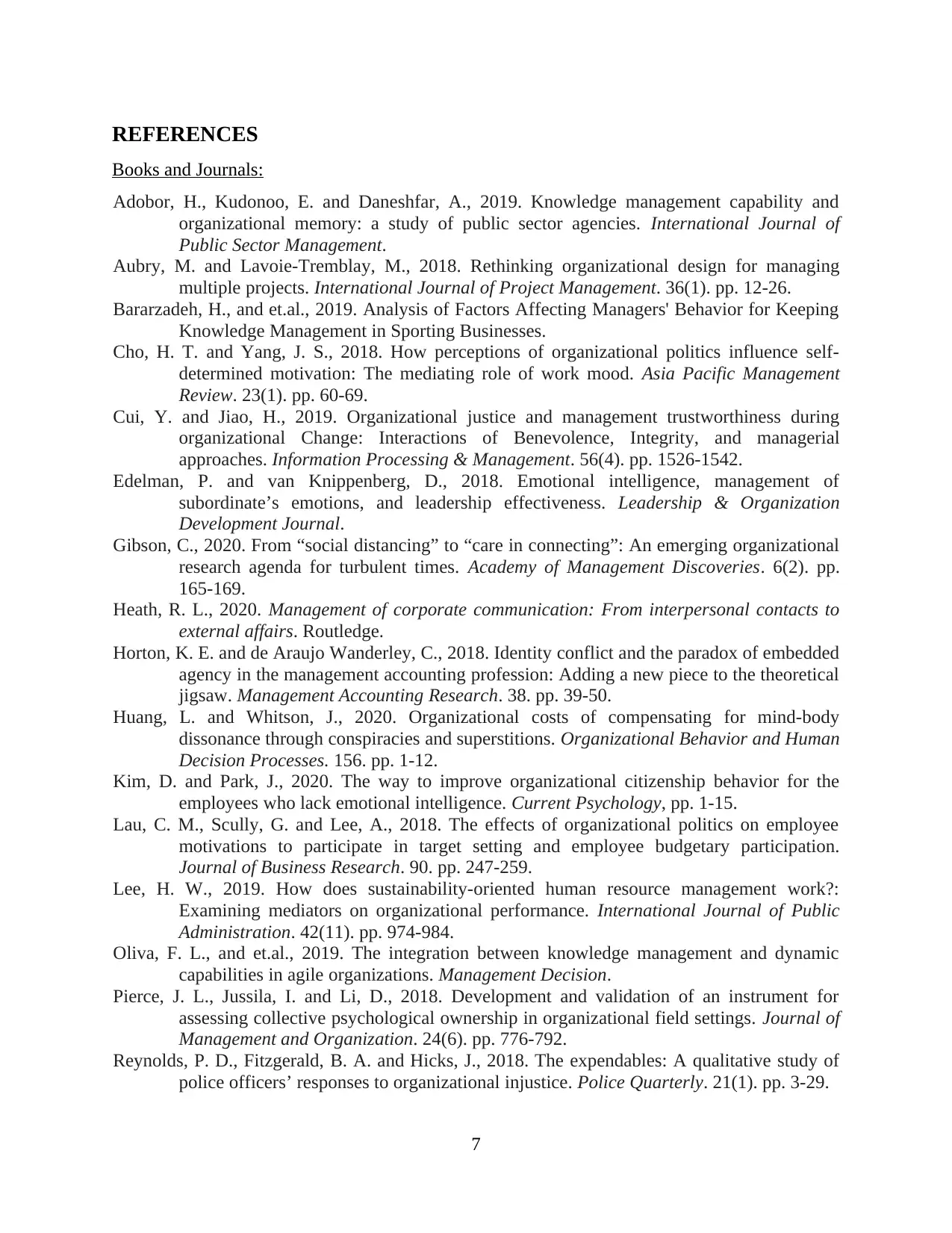
REFERENCES
Books and Journals:
Adobor, H., Kudonoo, E. and Daneshfar, A., 2019. Knowledge management capability and
organizational memory: a study of public sector agencies. International Journal of
Public Sector Management.
Aubry, M. and Lavoie-Tremblay, M., 2018. Rethinking organizational design for managing
multiple projects. International Journal of Project Management. 36(1). pp. 12-26.
Bararzadeh, H., and et.al., 2019. Analysis of Factors Affecting Managers' Behavior for Keeping
Knowledge Management in Sporting Businesses.
Cho, H. T. and Yang, J. S., 2018. How perceptions of organizational politics influence self-
determined motivation: The mediating role of work mood. Asia Pacific Management
Review. 23(1). pp. 60-69.
Cui, Y. and Jiao, H., 2019. Organizational justice and management trustworthiness during
organizational Change: Interactions of Benevolence, Integrity, and managerial
approaches. Information Processing & Management. 56(4). pp. 1526-1542.
Edelman, P. and van Knippenberg, D., 2018. Emotional intelligence, management of
subordinate’s emotions, and leadership effectiveness. Leadership & Organization
Development Journal.
Gibson, C., 2020. From “social distancing” to “care in connecting”: An emerging organizational
research agenda for turbulent times. Academy of Management Discoveries. 6(2). pp.
165-169.
Heath, R. L., 2020. Management of corporate communication: From interpersonal contacts to
external affairs. Routledge.
Horton, K. E. and de Araujo Wanderley, C., 2018. Identity conflict and the paradox of embedded
agency in the management accounting profession: Adding a new piece to the theoretical
jigsaw. Management Accounting Research. 38. pp. 39-50.
Huang, L. and Whitson, J., 2020. Organizational costs of compensating for mind-body
dissonance through conspiracies and superstitions. Organizational Behavior and Human
Decision Processes. 156. pp. 1-12.
Kim, D. and Park, J., 2020. The way to improve organizational citizenship behavior for the
employees who lack emotional intelligence. Current Psychology, pp. 1-15.
Lau, C. M., Scully, G. and Lee, A., 2018. The effects of organizational politics on employee
motivations to participate in target setting and employee budgetary participation.
Journal of Business Research. 90. pp. 247-259.
Lee, H. W., 2019. How does sustainability-oriented human resource management work?:
Examining mediators on organizational performance. International Journal of Public
Administration. 42(11). pp. 974-984.
Oliva, F. L., and et.al., 2019. The integration between knowledge management and dynamic
capabilities in agile organizations. Management Decision.
Pierce, J. L., Jussila, I. and Li, D., 2018. Development and validation of an instrument for
assessing collective psychological ownership in organizational field settings. Journal of
Management and Organization. 24(6). pp. 776-792.
Reynolds, P. D., Fitzgerald, B. A. and Hicks, J., 2018. The expendables: A qualitative study of
police officers’ responses to organizational injustice. Police Quarterly. 21(1). pp. 3-29.
7
Books and Journals:
Adobor, H., Kudonoo, E. and Daneshfar, A., 2019. Knowledge management capability and
organizational memory: a study of public sector agencies. International Journal of
Public Sector Management.
Aubry, M. and Lavoie-Tremblay, M., 2018. Rethinking organizational design for managing
multiple projects. International Journal of Project Management. 36(1). pp. 12-26.
Bararzadeh, H., and et.al., 2019. Analysis of Factors Affecting Managers' Behavior for Keeping
Knowledge Management in Sporting Businesses.
Cho, H. T. and Yang, J. S., 2018. How perceptions of organizational politics influence self-
determined motivation: The mediating role of work mood. Asia Pacific Management
Review. 23(1). pp. 60-69.
Cui, Y. and Jiao, H., 2019. Organizational justice and management trustworthiness during
organizational Change: Interactions of Benevolence, Integrity, and managerial
approaches. Information Processing & Management. 56(4). pp. 1526-1542.
Edelman, P. and van Knippenberg, D., 2018. Emotional intelligence, management of
subordinate’s emotions, and leadership effectiveness. Leadership & Organization
Development Journal.
Gibson, C., 2020. From “social distancing” to “care in connecting”: An emerging organizational
research agenda for turbulent times. Academy of Management Discoveries. 6(2). pp.
165-169.
Heath, R. L., 2020. Management of corporate communication: From interpersonal contacts to
external affairs. Routledge.
Horton, K. E. and de Araujo Wanderley, C., 2018. Identity conflict and the paradox of embedded
agency in the management accounting profession: Adding a new piece to the theoretical
jigsaw. Management Accounting Research. 38. pp. 39-50.
Huang, L. and Whitson, J., 2020. Organizational costs of compensating for mind-body
dissonance through conspiracies and superstitions. Organizational Behavior and Human
Decision Processes. 156. pp. 1-12.
Kim, D. and Park, J., 2020. The way to improve organizational citizenship behavior for the
employees who lack emotional intelligence. Current Psychology, pp. 1-15.
Lau, C. M., Scully, G. and Lee, A., 2018. The effects of organizational politics on employee
motivations to participate in target setting and employee budgetary participation.
Journal of Business Research. 90. pp. 247-259.
Lee, H. W., 2019. How does sustainability-oriented human resource management work?:
Examining mediators on organizational performance. International Journal of Public
Administration. 42(11). pp. 974-984.
Oliva, F. L., and et.al., 2019. The integration between knowledge management and dynamic
capabilities in agile organizations. Management Decision.
Pierce, J. L., Jussila, I. and Li, D., 2018. Development and validation of an instrument for
assessing collective psychological ownership in organizational field settings. Journal of
Management and Organization. 24(6). pp. 776-792.
Reynolds, P. D., Fitzgerald, B. A. and Hicks, J., 2018. The expendables: A qualitative study of
police officers’ responses to organizational injustice. Police Quarterly. 21(1). pp. 3-29.
7
Paraphrase This Document
Need a fresh take? Get an instant paraphrase of this document with our AI Paraphraser
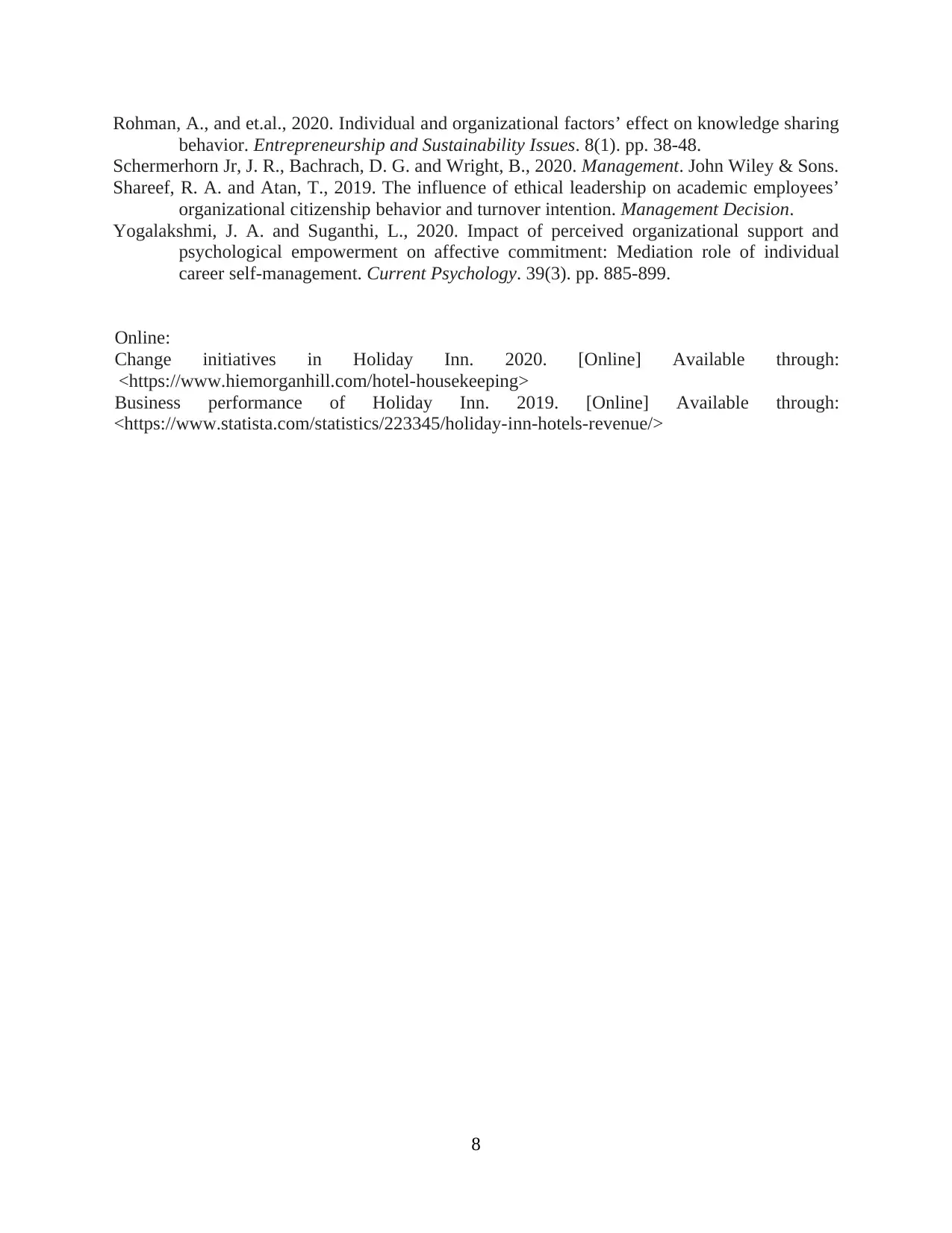
Rohman, A., and et.al., 2020. Individual and organizational factors’ effect on knowledge sharing
behavior. Entrepreneurship and Sustainability Issues. 8(1). pp. 38-48.
Schermerhorn Jr, J. R., Bachrach, D. G. and Wright, B., 2020. Management. John Wiley & Sons.
Shareef, R. A. and Atan, T., 2019. The influence of ethical leadership on academic employees’
organizational citizenship behavior and turnover intention. Management Decision.
Yogalakshmi, J. A. and Suganthi, L., 2020. Impact of perceived organizational support and
psychological empowerment on affective commitment: Mediation role of individual
career self-management. Current Psychology. 39(3). pp. 885-899.
Online:
Change initiatives in Holiday Inn. 2020. [Online] Available through:
<https://www.hiemorganhill.com/hotel-housekeeping>
Business performance of Holiday Inn. 2019. [Online] Available through:
<https://www.statista.com/statistics/223345/holiday-inn-hotels-revenue/>
8
behavior. Entrepreneurship and Sustainability Issues. 8(1). pp. 38-48.
Schermerhorn Jr, J. R., Bachrach, D. G. and Wright, B., 2020. Management. John Wiley & Sons.
Shareef, R. A. and Atan, T., 2019. The influence of ethical leadership on academic employees’
organizational citizenship behavior and turnover intention. Management Decision.
Yogalakshmi, J. A. and Suganthi, L., 2020. Impact of perceived organizational support and
psychological empowerment on affective commitment: Mediation role of individual
career self-management. Current Psychology. 39(3). pp. 885-899.
Online:
Change initiatives in Holiday Inn. 2020. [Online] Available through:
<https://www.hiemorganhill.com/hotel-housekeeping>
Business performance of Holiday Inn. 2019. [Online] Available through:
<https://www.statista.com/statistics/223345/holiday-inn-hotels-revenue/>
8
1 out of 11
Related Documents
Your All-in-One AI-Powered Toolkit for Academic Success.
+13062052269
info@desklib.com
Available 24*7 on WhatsApp / Email
![[object Object]](/_next/static/media/star-bottom.7253800d.svg)
Unlock your academic potential
Copyright © 2020–2026 A2Z Services. All Rights Reserved. Developed and managed by ZUCOL.




